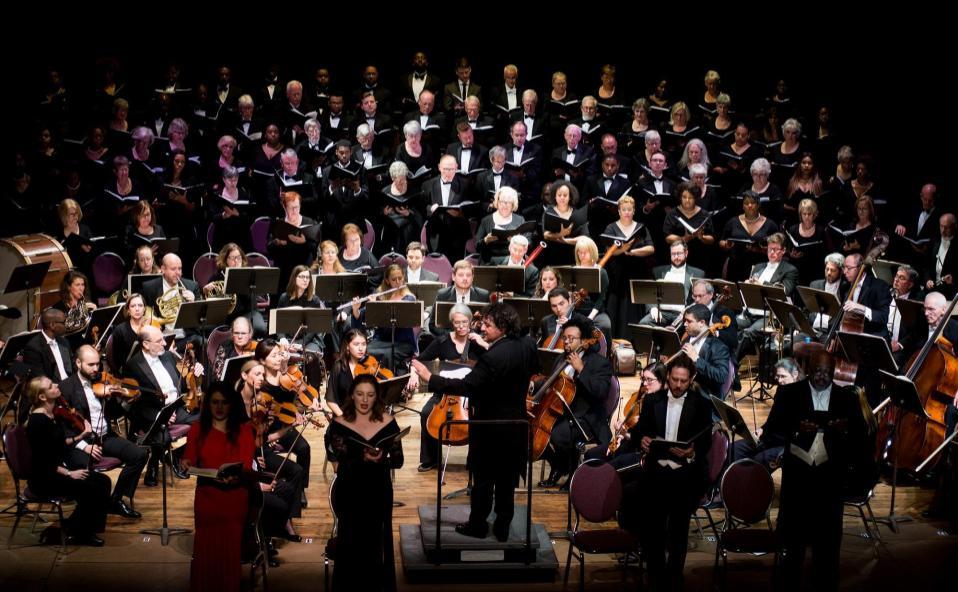As soon as he stepped to the podium Thursday evening at the acoustically sublime Easton Church of God sanctuary before a masked and vaccinated audience, Mid-Atlantic Symphony Orchestra music director Julien Benichou dispensed with what might have become a lingering elephant in the room. Why was it that the premiere of his concerto would not be performed as advertised? “The work is still in the works,” he said succinctly. And while we were left to wonder when his Romance for Strings might no longer be a work in progress but a part of the repertoire of the MSO, which he has skillfully led for 15 years, he moved on to the job at hand.
 In place of his own piece, Benichou chose J.S. Bach’s Concerto No. 3 of his six Brandenburg masterpieces. As an unassailably safe and popular selection, the concerto also has the virtue of familiarity with any classically trained musician, of which the 18 assembled for the opening concert of three in this series. (You can still catch a performance Saturday night in Rehoboth Beach or Sunday afternoon at Ocean Pines.)
In place of his own piece, Benichou chose J.S. Bach’s Concerto No. 3 of his six Brandenburg masterpieces. As an unassailably safe and popular selection, the concerto also has the virtue of familiarity with any classically trained musician, of which the 18 assembled for the opening concert of three in this series. (You can still catch a performance Saturday night in Rehoboth Beach or Sunday afternoon at Ocean Pines.)
Before raising his baton to the string orchestra before him, Benichou advised the audience to listen for solo portions within the violin, viola, and cello sections, as well as the solo harpsichordist. The violin section, led by Celaya Kirchner and Regi Papa, and the violists, led by Dorothy Couper, stood while performing the 15-minute concerto to emphasize their collective role as occasional soloists. At the same time, principal cellist Katie McCarthy and Bozena Brown on harpsichord remained seated, of course. The stand-up effect was stimulating, even if the seemingly enhanced vibrancy in the sound might have been an illusory trick of the imagination. Regardless, it made for a rousing performance of a classical standard, taking the place of something new.
The two pieces that followed showcased the rock-star guest soloist of the evening, Joshua Lauretig. The first was Vivaldi’s Oboe Concerto in C Major. MSO followers may remember that Lauretig, then 25, played its solo portions to win the runner-up prize in the inaugural Elizabeth Loker Concerto Competition in January 2020, just before COVID shut down live performances. Here, with a full-string orchestra, his virtuosity became apparent with a lyricism that suggested actual lyrics on layered waves riding above the cello and bass underpinnings of the opening movement. The more somber second movement took on a seductively hymnal tone while he played lead “guitar” to lush string ballroom accompaniment on the minuet finale.
Benichou dug deeper into the oboe repertoire for a Venetian contemporary of Vivaldi, Alessandro Marcello. But if the heart-strings second movement of his Oboe Concerto in D Minor sounds like something you’re heard before, it was probably at a wedding. After Mendelssohn’s famous down-the-aisle march, the Marcello Adagio is one of classical music’s standard wedding themes, and Lauretig’s unmasked double-reed fortissimo soared above it all.
Following intermission, Tchaikovsky’s Serenade for String Orchestra brought to mind both the composer’s talent and his torment. To be gay in 19th-century Russia, or most anywhere for that matter, was equivalent to being forbidden to live one’s true life. Serenade debuted in 1880, 13 years before his death and his most productive stretch as a musical genius. (Symphony No. 6 Pathetique, as well as the Sleeping Beauty, Swan Lake, and Nutcracker ballets, were yet to come.) The opening movement is almost schizophrenic in its moody and melodic teasing, never deciding where to go with either tendency.
The second movement, however, could find a home in any of the composer’s beloved ballets. A lovely and embraceable waltz that only strings could produce, this is Tchaikovsky as his best and most vulnerable. Knowing his history, you want to shed a tear for him. But the beauty, as tenderly rendered by the MSO string orchestra, is too joyful to be mourned.
Personally, I would have been happy to leave it at that. But for good reason, Tchaikovsky didn’t believe in happy endings. Subsequent movements of his serenade are both ponderous and reflective of his Russian folk musical background. But somehow, the piece manages to close with a note of hopeful harmony.
And the standing ovation was more than deserved for these purveyors of great music performed with skill, grace, and feeling.
Steve Parks is a retired New York arts critic and editor now living in Easton.
MID-ATLANTIC SYMPHONY ORCHESTRA’S ‘DOUBLE REED & SERENADE’
Tchaikovsky’s String Serenade with guest oboe soloist Joshua Lauretig, Vivaldi’s Oboe Concerto in C Major, and Alessandro Marcello’s Concerto for Oboe and Strings in D Minor. Thursday, Nov. 11, at the Church of God in Easton. It will also be performed at 7:30 p.m. Saturday at Epworth United Methodist Church, Rehoboth Beach, and 3 p.m. Sunday at Community Church, Ocean Pines. Tickets: midatlanticsymphony.org, 888-846-8800



Write a Letter to the Editor on this Article
We encourage readers to offer their point of view on this article by submitting the following form. Editing is sometimes necessary and is done at the discretion of the editorial staff.